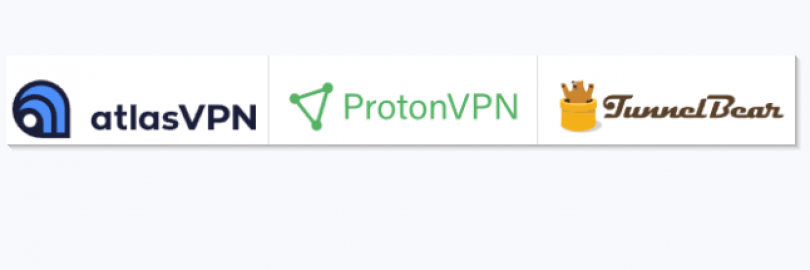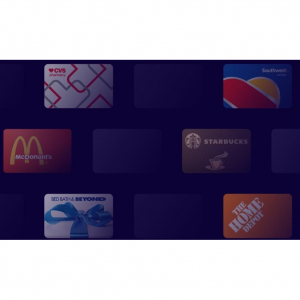
TunnelBear vs. Atlas VPN vs. ProtonVPN: Speed, Security, Servers & Price Compared 2025
Which is the best free VPN?What's the best free VPN in 2025?
Atlas VPN
ProtonVPN
TunnelBear
Money Saving Tip:
No matter which of the best VPN is right for you, you can get a free trial or a free version. Don’t forget to Sign up at Extrabux first before buying, (What is Extrabux?), then you can enjoy up to 45+% cashback on your purchase!
Sign-Up Bonus: Join for FREE & Earn $20 Welcome Bonus today!
1. Free Version: Atlas VPN vs. ProtonVPN vs. TunnelBear
Atlas VPN Free
Atlas VPN is one of the few services that offers a free version, which should not be underestimated. However, it's important to note that this plan has a 10 GB data limit, but it supports downloading and streaming media files.
Atlas VPN remains the king of value in this regard. As a free user, you can access three locations: Japan, Australia, and the United States. While there's no daily data cap, the free version doesn't give you access to streaming-optimized servers, 24/7 support, unlimited simultaneous connections, and the SafeBrowse feature.
ProtonVPN Free
If you don’t feel like spending money on a VPN, you’re in luck because you can get ProtonVPN for free.
Of course, the downside is that the free version restricts you to 1 connection with the same account. This is easily bypassable by using a separate account on each device, which you could also do.
However, that said, this free plan has some significant limits. It covers just one device, supports 'medium speeds' only, and gives you access to 23 servers in just three countries (US, Netherlands, Japan).
TunnelBear Free
TunnelBear pricing plans come in 3 main species: Free, Unlimited, and Teams. Naturally, if you're looking for a budget-friendly option, the Free plan is for you. If you need a standard subscription, you should go with Unlimited, whereas the Teams plan is reserved for business users.
Although the version is truly free, it comes with pretty significant restrictions. Yes, you may choose from 26 countries and connect to any of them. The problem is that you're given a 500 MB monthly cap. I used up all the data in about 5 minutes running through a few VPN speed tests.
Within the TunnelBear VPN app, it shows you the data that’s remaining in the bottom-right corner. While the 500 MB may help some to get a feel for TunnelBear, it is really inadequate compared to some other free trial VPN services.
If you want more data for the TunnelBear free plan, you can do promotional tweets of TunnelBear for an extra 1 GB.
When you run out of data, you will be alerted in the app and all connections will be blocked.
One of the things that are also worth mentioning is that TunnelBear doesn't officially have a money-back guarantee.
Which free VPN is more worth it?
The only advantage of TunnelBear's free plan is that you can connect to all countries and use all features. For example, if you want to connect to Argentina, it's hard to do with ProtonVPN Free, which only has three countries.
ProtonVPN and AtlasVPN may be more suitable as everyday VPNs. Because they have no data caps. But they limit the number of servers.
Depending on your usage, your needs may vary. Overall, AtlasVPN is the best free service out there.
2. Pricing and discounts: Atlas VPN vs. ProtonVPN vs. TunnelBear
| Pricing | from $1.39/month | from $8.00/month | from $3.33/month |
| 7-day trial | |||
| 1 month | $9.99/month | $10/month | $9.99/month |
| 1-year | $2.49/month | $8.00/month | $3.33/month |
| 2-year | |||
| 3-year | $1.39/month | ||
| 5-year | |||
| Cash Back | Get up to 100% cashback with Atlas VPN | Get up to 20% cashback with ProtonMail | Get up to 50% cashback with TunnelBear |
| Current deal | Atlas VPN coupon 86% OFF + 3 Months FREE | ProtonVPN coupon 50% OFF | TunnelBear coupon 67% OFF |
| Money-back guarantee | 30 days | 30 days | 0 days |
Atlas VPN
Atlas VPN is one of the cheapest VPNs on the market. Especially when remembering that the service offers unlimited simultaneous connections.
Its 3-year plan will save you a lot of cash as it's only $1.39 per month, or $50.04 for the entire subscription period.
However, if you don't want such a long-term commitment, you can try an annual plan that costs $2.49 per month. Meanwhile, those who just want to try Atlas VPN for a month will have to pay $9.99.
Each plan comes with a 30-day money-back guarantee, so you can try the paid options and decide if you like them to justify your purchase. Payment methods include credit card, Google Pay and PayPal.
However, if you want to get Atlas VPN for a very cheap price, use Extrabux's super coupon.
ProtonVPN
ProtonVPN offers four pricing plans – Free, Basic, Plus, Visionary. You can choose to pay both monthly, annually, and bi-annually.
Free. Three countries (the US, the Netherlands, Japan), one device, throttled speed, no torrenting, no Netflix.
Basic – from $4.00/month or $48 annually. All countries, two devices, torrenting.
Plus – from $8.00/month or $71.88 annually. All countries, five devices, torrenting, Netflix, Plus servers, Secure Core, Tor servers, Secure streaming.
Visionary – from $24.00/month or $288 annually. All countries, 10 devices, torrenting, Netflix, Plus servers, Secure Core, Tor servers, Secure streaming, ProtonMail Visionary subscription.
You can pay by credit card, PayPal, Bitcoin, and cash. Please note that Bitcoin and cash payments are accepted from the existing users only. Thus, you’ll need to create a free account first before buying.
You can try the Plus version for seven days for free. On top of that, every paid plan has a 30-day money-back guarantee.
TunnelBear Unlimited
Their unlimited plan removes the monthly data cap and adds five simultaneous device connections. This means you can set up TunnelBear on five separate devices and use them all at the same time. This should be enough for families or small groups of friends.
You can also choose between different subscription terms and enjoy greater discounts on longer terms. TunnelBear costs $9.99 a month, which is on the high side and comes with no discount due to its short duration.
To get the discount, you must choose at least one annual plan, which costs $59.88 or $4.99 per year if you spread it over 12 months. They claim their 3-year product is the best deal. It costs $120.00 for three years, which translates to a monthly price of $3.33. Remember, this will get you three years to use this service. If after a year you realize you'll be switching to a different service provider, you won't get a refund for months you haven't used.
TunnelBear Teams
One of the features of the Teams version is that you can try it for free for 7 days. Unlike the unlimited plan, this option has a separate account management dashboard. In it, you can add users, view invoices, and even delete unused users to get credit for the remaining subscription time.
Pricing is flexible. If you only have three users (minimum), the price is $207.00 per year (or $17.25 per month). This is the minimum amount. However, if you have 200 or more users, the price can quickly climb to $13,731.00 per year (or around $6 per user per month). Prices are expensive.
3. Speed and performance: Atlas VPN vs. ProtonVPN vs. TunnelBear
| VPN protocols: | WireGuard, IKEv2, OpenVPN (UDP/TCP) | WireGuard, OpenVPN (UDP/TCP), IKEv2, Shadowsocks | OpenVPN, L2TP/IPSec, PPTP, SSTP, IKEv2 |
| WireGuard | WireGuard | OpenVPN UDP | |
| Download average | 170Mbps | 92Mbps | 52Mbps |
| Upload average | 164Mbps | 89Mbps | 44Mbps |
We run our speed test using the fastest VPN protocol supported by each service.
Atlas VPN
The speed of Atlas VPN has greatly improved since the implementation of the WireGuard tunneling protocol. The average download speed only slows you down by about 20%, which is what you'd expect from WireGuard since it's one of the fastest protocols on the market. As for average upload speeds, the drop was even smaller, at about 6 percent. Ping follows reasonable margins and increases proportionally based on your distance.
Overall, Atlas VPN offers solid speeds. While this isn't one of the provider's strengths, it is now. This is because IKEv2 is the only protocol available to the provider, but Atlas VPN recently implemented WireGuard, which is faster and more secure.
ProtonVPN
Although ProtonVPN's speeds have generally improved since our last review. With the addition of the WireGuard protocol in 2021, the provider has taken another step towards becoming one of the top VPNs overall.
ProtonVPN's speeds can be inconsistent, but overall it's pretty fast. While sometimes the provider can show some great speed results, in other cases it can slow down your connection significantly. For example, the speed remained similar in most countries, but dropped markedly in Japan, a country farther from Europe.
According to the table, the download speed was reduced by 6.5% to 49.23% when using WireGuard. On average, ProtonVPN can retain about 85% of the speed.
So while there are faster VPN providers on the market, your experience will depend on the connection protocol, distance from the server, and other features. Naturally, speeds drop when using the Tor over VPN option, so you'll have to balance security measures and speed if you want a pleasant online experience.
TunnelBear
TunnelBear's speeds aren't great. When using OpenVPN (TCP), you may experience quite severe slowdowns. Baseline download speeds can be reduced by up to 80% when connecting to other European countries, 90% when connecting to the Americas, and 99% when connecting to the farthest Asian countries.
TCP is generally slower, and better with other tunneling protocols. That being said, TunnelBear does not differentiate between OpenVPN (UDP) and IKEv2. You will be automatically assigned one or the other. You won't know which one it is unless you are running a port scan to verify which tunneling protocol you are using.
4. Servers: Atlas VPN vs. ProtonVPN vs. TunnelBear
| Servers/locations | 700+/31 | 1500+/61 | 1800+/26 |
Atlas VPN
Atlas VPN has just over 700 servers in 31 countries. Those numbers seem low compared to VPN market veterans. Atlas VPN used to be a mobile-only VPN service, so these numbers reflect the variety of free apps typically offered in mobile app stores. While the service did catch up with the introduction of desktop clients, its fleet size still has room to grow.
Currently, the server selection is the largest in Europe - you can choose from 23 locations. The rest of the world has far less coverage, offering just four countries in Asia, two in the Americas, and two in the Rest of the World.
When connecting to a server, you can choose a SafeSwap. A server with this feature will route your traffic through multiple IP addresses, making it nearly impossible to track you.
ProtonVPN
ProtonVPN has over 1500 servers in 61 countries. It's worth noting that the number of servers you can connect to depends on the plan you have. The locations with the highest server coverage are Europe, Asia, and the Americas.
Free users can only connect to servers in Japan, the Netherlands, and the United States.
Both ProtonVPN Plus and Visionary plans offer all servers in 54 countries, while the basic subscription only gives you access to 400+. Servers with unique features like Secure Core VPN and TOR over VPN are only available to Plus and Visionary subscribers.
TunnelBear
TunnelBear has around 1800 servers in 26 countries. Let's compare this to other VPN service providers, like ExpressVPN that has 3000 in 94 countries, or CyberGhost, with 6400 servers in 88 countries. TunnelBear seems on the low side and regions outside of America and Western Europe have less coverage.
Still, it's worth mentioning that during last year they almost doubled their server locations. If they continue to move in this direction, they can catch up with market leaders.
5. Security and Privacy: Atlas VPN vs. ProtonVPN vs. TunnelBear
Country/jurisdiction | Canada | ||
| Logging | No logs | No logs | No logs |
Atlas VPN
Atlas VPN is located in Delaware, USA. Unfortunately, the US is at the forefront of the Five Eyes alliance, not a privacy-friendly jurisdiction, which is why this won't be one of Atlas VPN's selling points.
However, just like other anonymous VPN services, Atlas VPN does have a no-logs policy. The document said they did not store any private information. Their policy mentions that you can contact them to delete your account permanently.
In October 2021, it was confirmed that Atlas VPN would be acquired by Nord Security, the parent company of NordVPN. This is great news for users of Atlas VPN, as the agreement means that Atlas VPN must adhere to the same security standards and practices as Nord VPN, the VPN world leader.
Specifically, Atlas VPN uses AES-256 ciphers. This is the current data protection standard used by many governments and financial institutions.
As for the tunneling protocol, there are two options: IPSec/IKEv2 and WireGuard. The latter is the latest addition to Atlas VPN and ensures faster speeds and lower pings.
ProtonVPN
ProtonVPN's Swiss home gives it an immediate privacy advantage over most of the competition. The country has very strong privacy laws, is outside of US and EU jurisdiction, and not a member of the '14 eyes' surveillance network.
The company states its logging policy very clearly on the website: "ProtonVPN is a no logs VPN service.
In the past, ProtonVPN used to be a closed source provider, like many other VPN providers on the market. Not that long ago, they did a complete 180 turn and went open-source with all of their apps. You can go to their GitHub and read through all their documentation yourself. They also publicly declared they would invest in third-party security audits.
Like many popular VPN service providers, ProtonVPN uses AES-256-CBC encryption for its connections to the server fleet. To establish a connection between your device and the VPN servers, the service uses several tunneling protocol options: WireGuard, OpenVPN (TCP or UDP variant), and IKEv2/IPsec.
TunnelBear
TunnelBear does not monitor or log your activity. It's a privacy-friendly approach, but for true anonymity, you should pay in cryptocurrency and take other precautions. TunnelBear is also based in Canada, a country that is a member of Five Eyes, a coalition known for its mass surveillance efforts and powerful intelligence agencies. For the average user, this probably shouldn't be a deal breaker, but others may want to take note.
TunnelBear has submitted their app for an independent security audit three years in a row. Compared to other VPN service providers, TunnelBear has passed more audits in a few years than some competitors in a decade.
6. Features: Atlas VPN vs. ProtonVPN vs. TunnelBear
| IP Addresses | Dynamic | Dynamic | Static |
| Kill switch | Yes | Yes | Yes |
| Split tunneling | Yes | Yes | Yes |
| Web filters | TunnelBear Blocker | ||
| Dedicated IP | SafeSwap | ||
| Double VPN | double VPN | ||
| Onion over VPN | Tor over VPN | ||
| Dark Web Monitoring | Yes | ||
Data hack detection | Port forwarding | Port forwarding | |
| IPv6 leak protection | IPv6 leak protection | IPv6 leak protection | |
| Peer to Peer (P2P) Servers | |||
| Obfuscated servers | Alternate routing | obfuscated GhostBear servers | |
| SOCKS5 proxy | SOCKS5 proxy |
7. Streaming and Torrenting: Atlas VPN vs. ProtonVPN vs. TunnelBear
| Netflix | No | Yes | No |
| Torrenting | Yes | Yes | Yes |
| P2P | Yes | Yes | Yes |
Atlas VPN
We cannot view content from any Atlas VPN US servers. But it got us through BBC iPlayer.
Atlas allowed us to stream content immediately once we visited Amazon Prime in the US. We continue to use Disney Plus and can also visit the site.
ProtonVPN
ProtonVPN primarily sells on privacy and security, but it also has some strong unblocking capabilities.
For example, BBC iPlayer works well against many small VPNs, but ProtonVPN easily broke through its defenses and allowed us to stream whatever content we liked.
We were equally successful on Netflix in the UK and US.
Amazon Prime Video can be a challenge for some providers, but not ProtonVPN. We stream US-only content from all test locations.
The service also unlocks US Disney Plus.
This is a great result, but keep in mind that you need at least a ProtonVPN Plus account to get this level of performance. Free account or basic subscription will not work.
TunnelBear
We logged into TunnelBear's UK location and tried to access BBC iPlayer. We had no luck on three different IPs, which is disappointing as Tunnelbear unblocked iPlayer in our last review.
The same goes for US Netflix. No matter what we do, Netflix is denying us access to US content.
There's good news when Tunnelbear unblocks Amazon Prime Video with each of our test IPs. However, regardless of the locations we tried, when we couldn't access Disney Plus, the normal sub-par service went back to normal.
8. Compatibility and connections: Atlas VPN vs. ProtonVPN vs. TunnelBear
| Supported OS | Windows, Mac, Android, iOS, Linux | Windows, Mac, Android, iOS, Linux | Windows, Mac, Android, iOS, Linux |
| Browser Extensions | Chrome and Firefox | Chrome, Firefox | Chrome, Firefox |
| Supported Devices | Chromebook, Smart TVs, Chromecast, Roku, Xbox, Nintendo, and PlayStation. | Xbox One, PlayStation 4, Apple TV, Chromebook | |
| Maximum devices supported: unlimited | Maximum devices supported: 10 | Maximum devices supported: 5 |
Just by looking at the table, you can see that each provider does an excellent job of supporting applications.
9. Ease of use and support: Atlas VPN vs. ProtonVPN vs. TunnelBear
| Support: | Knowledge base, FAQs, email, chatbot, 24/7 live chat | Knowledge base, FAQs, email, 24/7 live chat | Live Chat, Email, installation guide, billing info, blogs but not dedicated help |
| Payment Options | :Credit card, Google Pay, AmazonPay, ACH Transfer, UnionPay, Crypto Currencies, PayPal (via Paddle), Bitcoins | PayPal, Credit card | PayPal, Credit card, Google Pay, Bitcoins |
All three VPN services have easy-to-use applications.
Which is the best free VPN?
Atlas VPN and ProtonVPN sit at the top of our best free VPN buying guide, offering unlimited broadband, generous data, and multiple servers across three locations.
It's also one of the cheapest VPNs if you're paying for it. However, it only allows us to watch Netflix Originals.
There are also some paid VPN trial periods on the market that come with money-back guarantees, so why not try something like Surfshark? It's one of the best value for money in our many VPN buying guides!

Extrabux is an international cashback shopping site, offering up to 30% cashback from 10,000+ Stores!
Squarespace, SkinStore, MATCHESFASHION, The Wall Street Journal, NordVPN, Visible, Armani Exchange, Sam's Club, PUMA, AliExpress, Card Cash, NET-A-PORTER, Udacity, Udemy, Selfridges, LOOKFANTASTIC, Vimeo, Coach Outlet, lululemon, PrettyLittleThing, Booking.com, Ripley's Aquarium, iHerb, Groupon, etc.
Join to get $20 welcome bonus now! (How does Welcome Bonus work?)
Recommendation
-

Is Turkish Airlines Good for International Flights?
-

10 Best & Stylish Winter Coats for Women on NET-A-PORTER in 2025
-

Top & Best 12 Sneaker Apps/Websites for Raffles, Releases & Restocks in 2025
-

7 Best Gift Card Exchange Sites - Buy, Sell and Trade Discount Gift Card Safely and Instanly!
-

Top 9 Professional Skincare Brands for Licensed Estheticians 2025










